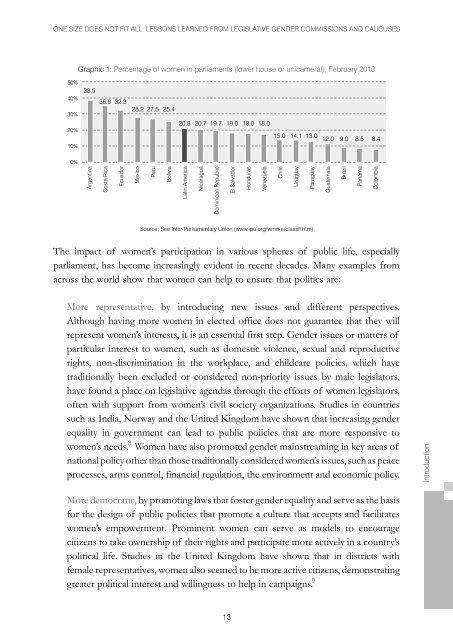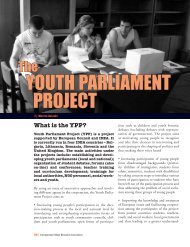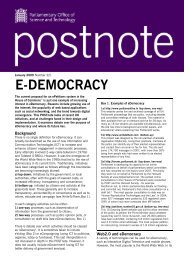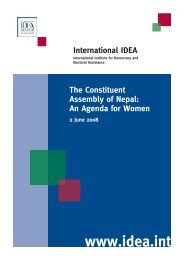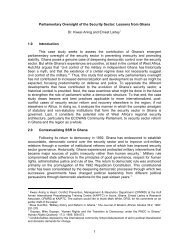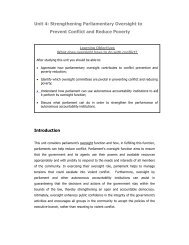One Size Does Not Fit All - International IDEA
One Size Does Not Fit All - International IDEA
One Size Does Not Fit All - International IDEA
- No tags were found...
Create successful ePaper yourself
Turn your PDF publications into a flip-book with our unique Google optimized e-Paper software.
ONE SIZE DOES NOT FIT ALL: LESSONS LEARNED FROM LEGISLATIVE GENDER COMMISSIONS AND CAUCUSESGraphic 1: Percentage of women in parliaments (lower house or unicameral), February 201050%40%30%20%10%38.536.8 32.328.2 27.5 25.420.8 20.7 19.7 19.0 18.0 18.015.0 14.1 13.0 12.0 9.0 8.58.40%ArgentinaCosta RicaEcuadorMexicoPeruBoliviaLatin AmericaNicaraguaDominican RepublicEl SalvadorHondurasVenezuelaChileUruguayParaguayGuatemalaBrazilPanamaColombiaSource: See Inter-Parliamentary Union (www.ipu.org/wmn-e/classif.htm)The impact of women’s participation in various spheres of public life, especiallyparliament, has become increasingly evident in recent decades. Many examples fromacross the world show that women can help to ensure that politics are: AAAAAAAAMore representative, by introducing new issues and different perspectives.Although having more women in elected office does not guarantee that they willrepresent women’s interests, it is an essential first step. Gender issues or matters ofparticular interest to women, such as domestic violence, sexual and reproductiverights, non-discrimination in the workplace, and childcare policies, which havetraditionally been excluded or considered non-priority issues by male legislators,have found a place on legislative agendas through the efforts of women legislators,often with support from women’s civil society organizations. Studies in countriessuch as India, Norway and the United Kingdom have shown that increasing genderequality in government can lead to public policies that are more responsive to8women’s needs. Women have also promoted gender mainstreaming in key areas ofnational policy other than those traditionally considered women’s issues, such as peaceprocesses, arms control, financial regulation, the environment and economic policy.IntroductionMore democratic, by promoting laws that foster gender equality and serve as the basisfor the design of public policies that promote a culture that accepts and facilitateswomen’s empowerment. Prominent women can serve as models to encouragecitizens to take ownership of their rights and participate more actively in a country’spolitical life. Studies in the United Kingdom have shown that in districts withfemale representatives, women also seemed to be more active citizens, demonstrating9greater political interest and willingness to help in campaigns. aaaaaaaaaaaaaaaaaaaa13


